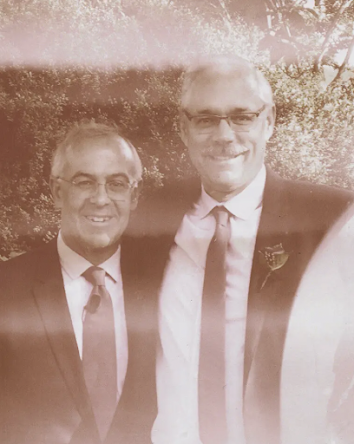On the left is New York Times' columnist David Brooks. On the right is Peter Marks, one of Brooks' dearest, long-term friends. Marks, in fact, was a friend that Brooks knew from the time that Brooks and Marks were both eleven years old. Today, Brooks is sixty-one.
In its February 12, 2023, edition, The Times printed a heart-rending column about the friendship between Brooks and Marks. The title of Brooks' column was, "How Do You Serve A Friend in Despair?" Brooks' column reported on the death of Marks, by suicide, after a long struggle with depression. If The Times' paywall prevents you from using the link above to read the column, you might try this link as an alternative.
One of Brooks' phrases struck me. Telling his readers that he "did not understand the seriousness of the situation," Brooks confessed to a temperamental bias. "Some people catastrophize and imagine the worst," Brooks said, but Brooks reports that he does the opposite: "I tend to bright-icize."
One lesson I draw from Brooks' column is that trying to "bright-icize" things for persons who are battling depression is probably not a helpful strategy. The problem, of course, is to figure out some other strategy that might be more effective. Unfortunately, Brooks' column doesn't offer up any real help, which I was hoping it might, since I have had, and I do have, friends who are struggling with depression and despair, just as Marks did.
I had a more general reaction to Brooks' discussion, as well - and particularly to his reflection about his tendency to "bright-icize" things. It strikes me that many of us do what Brooks reports: we "bright-icize" events. We provide (to ourselves and others, but to ourselves, above all) the most "positive" possible interpretation of events and circumstances. That is a technique and tactic that we use to avoid an otherwise inevitable confrontation with the truly difficult and oppressing realities that we routinely encounter. Of course, we also, sometimes, embrace the exact opposite tendency, finding a way to engage in "doomscrolling," bringing to the forefront all the "negatives," as we contemplate the realities of our lives, and of the world in which we live.
I would like to suggest that we need to avoid BOTH tendencies.
The "bright-icize" bias, conveyed to friends and acquaintances who are trying to deal with genuinely oppressive realities might push them in exactly the wrong direction. Similarly, rehearsing all the horrible realities of our existence, and projecting the "doom" that may shortly fall upon us, poses exactly the same danger. And it is we, of course, not just our friends and acquaintances, who are put at risk by both the "bright-icize" and the "doomscrolling" bias.
The last line of a favorite Bob Dylan song popped immediately into my mind, as I considered the importance of avoiding both tendencies just discussed. "It's Alright Ma (I'm Only Bleeding)" is the song I'm talking about, and here's the last verse:
If my thought-dreams could be seen
They’d probably put my head in a guillotine
But it’s alright, Ma, it’s life, and life only
Click the link above if you want the complete lyrics. You can listen to Dylan sing the song by clicking on the link, below. For what it's worth, I do think that Dylan provides us with some pretty good advice in his song. We are here. We are alive, and why and how that's true is just a mystery we can never fathom. Neither bemoaning our fate, or "bright-icizing" it, is anything but an effort to ward off accepting the life we actually have, whatever it is, unasked for as it was.
Every one of us, I think, can understand the reason we try to dodge the actual realities of the life in which we find ourselves. And this is true whether our natural tendency is towards a "bright side" or a "dark side" bias.
Times are bad. And they're golden, too. Same for me, as it is for you. We can see life as a blessing, or a burden if we choose. We can try to avoid what life presents us, or be devoted to the news. We can contemplate the darkness, or try to conjure up the light, but it's life, and life only. Bob Dylan has it right.
https://www.nytimes.com/2023/02/09/opinion/despair-friendship-suicide.html


No comments:
Post a Comment
Thanks for your comment!